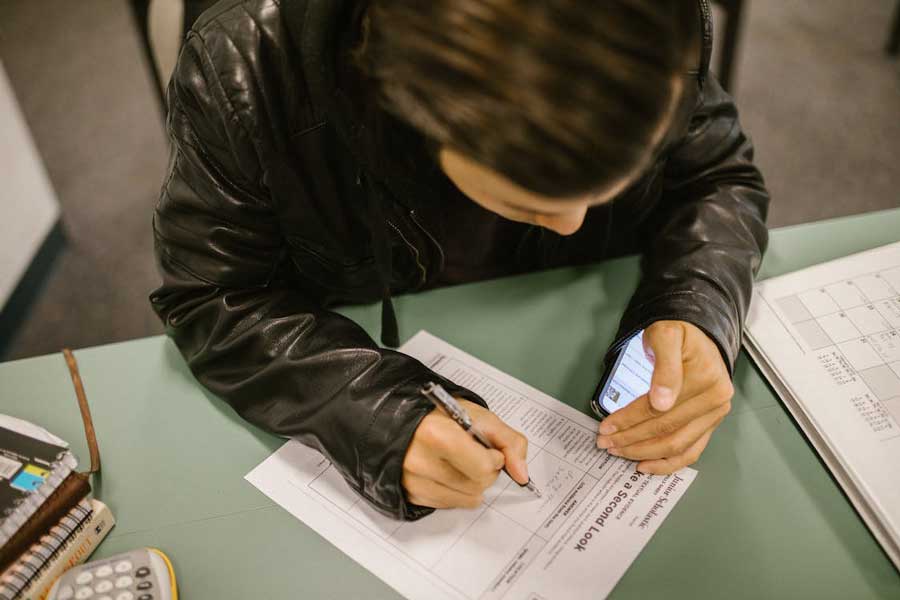Islam introduces or adjusts our ideas about ourselves or the world, and when necessary, corrects our understanding of previously held beliefs or viewpoints. Islam also highlights the idea of seeking knowledge which lit a fire beneath the early Muslims to try and understand the world around them. During Prophet Muhammad’s time, the striving for knowledge involved memorizing the verses of the Qur’an as they heard them. The Muslims also committed to memory what the Prophet said and did in order to preserve his teachings. This laid the foundation for the science of isnad – the chain of narrators going back to the Prophet, with each narrator substantiated as reliable and trustworthy in order for the hadith to be considered authentic.
We see that referencing who the narrator heard the hadith from, and then each one in the chain referring back to the one he or she heard it from, is a form of citation. In our contemporary world, there is an issue that arises when a writer does not reference a source from which he or she took exact words or content, or even an original idea. This is the essence of plagiarism.
Plagiarism, or presenting someone else’s information as your own, without proper attribution, is theft of intellectual property. This is on the rise in many fields including education, business, and science. Unfortunately, Muslims also commit plagiarism. According to an article at virtualmosque.com, “In many Islamic forums on the Internet and even established Islamic websites, we sometimes find entire articles copied verbatim from other sources without any link or reference being made to the site where it is originally published. Indeed, in all too many cases, even the article’s original author is not mentioned.”
Plagiarism takes various forms but, according to details provided by Bowdoin College, the four common kinds of plagiarism are accidental, self, direct, and mosaic. It is conceivable that someone might forget or accidentally leave out quotation marks, attributions, or even sources when in a hurry or out of ignorance. That would be considered accidental or mosaic plagiarism. Mosaic, however, goes the extra step of using another’s content but just replacing words with similar meanings while following the original work very closely and not giving the appropriate credit. Self-plagiarism is a more common occurrence between late high school and early college years when a student might think that content previously written by him can be used in part or whole for a future class. However, according to Bowdoin College, if the previous professor(s) did not grant permission to reuse that work, it constitutes plagiarism. The most egregious form of plagiarism is simply lifting whole passages of someone’s work without attribution, sourcing, or quoting – direct stealing.
Turnitin, a plagiarism checker used by students and teachers, catalogues other more current forms like text spinning (a software that rewrites the passage to fool the plagiarism checker) and AI programs that write some or all of an essay.
There are common reasons that someone might plagiarize — it’s not a mystery. A student might be a procrastinator, not know any better, fear failure, feel pressured to get good grades, doesn’t care enough or has no fear of consequences. Colleges and universities all post academic rules for student conduct and always include plagiarism as a reason for expulsion. Since the Covid lockdown, plagiarism rates have gone up by 10 percent. This is the age of online research, social media postings, and “shares” where the lines have blurred for this generation between stealing and borrowing, or copying and sharing. The internet, though, has also made it extremely easy to find the original sources, thereby reducing the number of students getting away with written plagiarism. Plagiarism can be difficult to catch and remedy as classrooms today are crowded, leaving teachers with little time to learn a student’s writing style, so they have to rely on software like Turnitin. Many teachers may not have the time to assess why a student presented another’s work as their own and simply punish them with failure or expulsion.
Stealing Intellectual Property
A close relative of plagiarism is the stealing of intellectual property like music, art, technology, or in the case of Muslims, Qur’anic recitations, and music by Muslim artists. One can go on YouTube, TikTok, or other social media sites and view a video or post with Qur’anic verses played over nature images with recitation by a famous reciter, often without attribution and likely without permission. It is easy to find sampled Islamic songs, used without permission or royalties, as backgrounds to fundraising videos for masajid or nonprofit relief organizations. Artists like Maher Zain, Zain Bika, or countless others lose the income that their artistic property could have generated because a Muslim feels entitled to use another Muslim’s works, thinking that the artist will get their reward in the afterlife, or because the “borrowing” is done while working under the Islamic nonprofit umbrella. Therefore, they justify that since profit is not their motive, it feels okay.
However, the seriousness of theft, according to Islam, is shown by the punishment meted out to the thief. The punishment for theft of physical property is cutting off the hand. According to the Qur’an, the most egregious form of theft carries a physical punishment that also acts as a deterrent to others. In Surah Al-Ma’idah, verse 38, Allah states; ‘‘[As for] the thief, the male and the female, amputate their hands in recompense for what they committed, an example from Allah. And Allah is Exalted in Might and Wise.” There are, however, multiple and precise parameters that are in effect, determining whether the most severe penalty is to be carried out. If, for example, the theft took place out of need such as hunger, the punishment can be mitigated. An article by Dr. Jonathan Brown at Yaqeen Institute details the many stipulations that determine the punishment for theft of physical property. The article also cites the hadith that informs the application of hudud punishments (punishments mandated by Allah SWT). The Prophet (s) said, “Ward off the hudud from the Muslims as much as you can, and if you find a way out for the person, then let them go. For it is better for the authority to err in mercy than to err in punishment.”
While plagiarism is not theft of a physical object, it is still a form of theft. In our secular society, theft of intellectual property or plagiarism is not considered a crime but rather “a violation of honor and ethics,” according to Cornell’s Legal Information Institute. They also note, however, that “plagiarism can warrant legal action if it infringes upon the original author’s copyright, patent, or trademark.” In most cases of plagiarism by college students, punishments lean toward a failing grade or even expulsion from the school. In the case of journalists who plagiarize, they usually face public embarrassment and loss of prestige, or even loss of employment. Yet, these types of theft should not be seen as insubstantial. In the article at virtualmosque.com, the author cites the saying of Prophet Muhammad (s): “He who credits himself with what was not given to him is like one who wears a double cloak of deception” (Ibn ‘Abd al-Barr, Jâmi` al-Tahsîl).
The Muslim who copies and pastes, changing a word here or there, or restructuring a sentence or paragraph, should ask himself, “Could I stand before Allah and claim all parts of this work as my own?” If the question gives pause or unease, then the only reasonable remedy is to give credit to whom it belongs. Plagiarism and intellectual misappropriation come down to trust. Can readers and viewers trust the source? Can writers and artists trust that their property will not be stolen? As the ayah in Suratul Nisa states, “Allah commands you to render trusts to their owners” (Qur’an 4:58).






